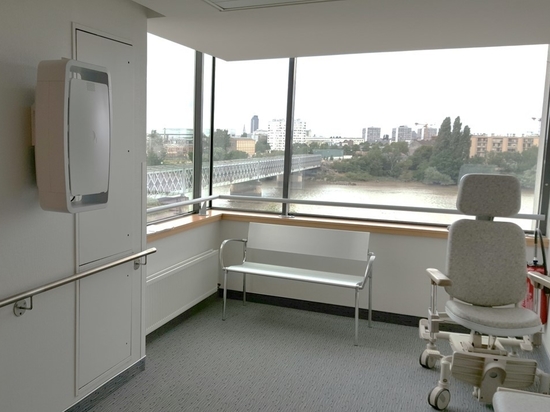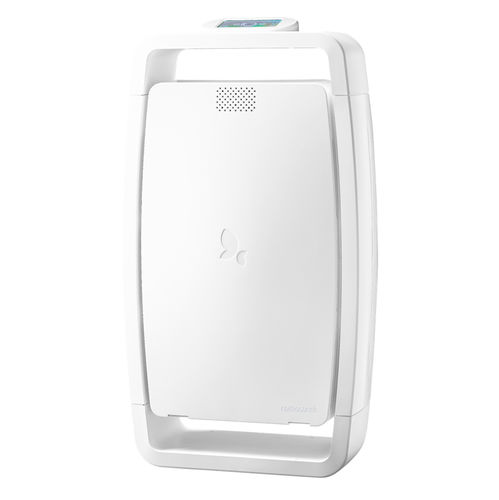
#Industry News
Air Contamination in Veterinary Clinics:
The Importance of Effective Air Purification
In veterinary clinics, the ambient air can become contaminated with a range of chemicals from daily-used products, posing health risks to veterinarians, staff, animals, and clients. These pollutants include anaesthetics, disinfectants, cleaning agents, medications, and other pharmaceutical substances.
To maintain a safe and healthy environment, installing air purification systems such as NatéoSanté’s EOLIS Air Manager is essential. These purifiers are specifically designed to eliminate airborne contaminants, ensuring cleaner, safer air.
Common Sources of Chemical Pollution in Veterinary Clinics
Veterinary clinics are often exposed to various types of chemical pollutants:
- Anaesthetics: Gases like isoflurane and sevoflurane, used for general anaesthesia, can cause side effects such as headaches, nausea, dizziness, or respiratory issues, especially in sensitive individuals.
- Disinfectants and Sterilisers: Chemicals such as glutaraldehyde and formaldehyde, often used for disinfection and preservation, may cause respiratory irritation, allergic reactions, and, in the case of formaldehyde, cancer risk.
- Cleaning Agents: Ammonia and aliphatic hydrocarbons, widely used for surface cleaning, can lead to respiratory problems and irritation.
- Medications: Aerosol antibiotics, chemotherapy drugs, and antiparasitics used in clinics can pollute the air and pose health risks to both staff and animals.
Measures to Reduce Air Pollution Risks in Veterinary Clinics
To protect the health of everyone in the clinic, several key measures should be implemented:
- Proper Ventilation: Ensure adequate ventilation to reduce the concentration of indoor air pollutants.
- Protective Equipment: The use of personal protective equipment (PPE) such as masks and gloves is crucial to minimise exposure to hazardous substances.
- Staff Training: It is vital to train staff on best practices for handling chemical products.
- Safe Storage: Chemical products should be stored in well-ventilated and secure areas.
- Air Quality Monitoring: Utilise devices to continuously monitor air quality, detect anaesthetic gas leaks, and control pollutant levels such as carbon dioxide.
- Air Purifiers: Install air purification systems to efficiently remove fine particles, pathogens, and other airborne contaminants.
Why Choose EOLIS Air Manager Purifiers?
NatéoSanté’s EOLIS Air Manager purifiers are specifically designed for medical and veterinary environments. Their key benefits include:
- High-Performance Filtration: Equipped with medical-grade HEPA filters, these purifiers capture up to 99.97% of fine particles, including bacteria, viruses, and mould.
- Pollutant Neutralisation: Featuring activated carbon filters and advanced technology, they neutralise volatile organic compounds (VOCs) and odours.
- Continuous Monitoring: Smart sensors automatically adjust the purifier’s operation based on the detected air quality.
- Deep Clean 60 Technology: The EOLIS Air Manager 600S and 1200S models incorporate patented Deep Clean 60 technology, allowing 99% disinfection using controlled ozone, without the need for chemicals.
- UV-C Protection: Integrated UV-C lamps provide additional protection by destroying airborne viruses and bacteria.
Proven Effectiveness in Veterinary Environments
A study conducted in a veterinary clinic demonstrated the effectiveness of EOLIS Air Manager purifiers, particularly in reducing levels of formaldehyde, a known carcinogen. The results showed a 60% decrease in formaldehyde pollution peaks and an 80% improvement in air quality, meeting regulatory standards.
Given the wide range of chemical products and pathogens present, veterinary clinics require stringent hygiene measures. EOLIS Air Manager purifiers are invaluable in maintaining a healthy environment, especially in critical spaces such as examination and surgical rooms.






